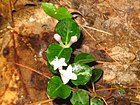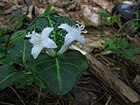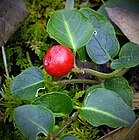Note: This is a project under development. The articles on this wiki are just being initiated and broadly incomplete. You can Help creating new pages.
Difference between revisions of "Mitchella repens - Partridge berry"
Chaithrika (talk | contribs) m (Chaithrika moved page Partridge berry to Mitchella repens: renaming as per convention) |
(→References) |
||
| (14 intermediate revisions by 3 users not shown) | |||
| Line 1: | Line 1: | ||
[[File:Mitchella repens 03.jpg|thumb|right|''Mitchella repens'', ''Partridge berry'']] | [[File:Mitchella repens 03.jpg|thumb|right|''Mitchella repens'', ''Partridge berry'']] | ||
| − | '''Partridge berry''' | + | '''Partridge berry''' is the best known plant in the genus Mitchella. It is a creeping prostrate herbaceous woody shrub occurring in North America belonging to the madder family. |
| − | == | + | ==Uses== |
| − | + | {{Uses|Wounds}}, {{Uses|Cuts}}, {{Uses|Snakebites}}, {{Uses|Curing liver disorders}}, {{Uses|Skin eruptions}}, {{Uses|Blotches}}, {{Uses|Pimples}}, {{Uses|Diarrhea}}, {{Uses|Sore throats}} | |
| − | |||
| − | + | ==Parts Used== | |
| + | {{Parts Used|Dried folaige}}, {{Parts Used|Whole herb}}. | ||
| − | + | ==Chemical Composition== | |
| + | Contains volatile oils, flavonoids, apigenin, luteolin, quercetin, kaempferol, tiliroside, triterpene glycosides including euscapic acid and tormentic acid, phenolic acids, and 3%–21% tannins<ref name="chemical composition"/> | ||
| − | == | + | ==Common names== |
| + | {{Common names|kn=|ml=|sa=|ta=|te=|hi=|en=Partridge berry}} | ||
| − | + | ==Properties== | |
| − | + | Reference: Dravya - Substance, Rasa - Taste, Guna - Qualities, Veerya - Potency, Vipaka - Post-digesion effect, Karma - Pharmacological activity, Prabhava - Therepeutics. | |
| + | ===Dravya=== | ||
| + | |||
| + | ===Rasa=== | ||
| + | |||
| + | ===Guna=== | ||
| + | |||
| + | ===Veerya=== | ||
| + | |||
| + | ===Vipaka=== | ||
| + | |||
| + | ===Karma=== | ||
| + | |||
| + | ===Prabhava=== | ||
| + | |||
| + | ==Habit== | ||
| + | {{Habit|Herb}} | ||
| + | |||
| + | ==Identification== | ||
| + | ===Leaf=== | ||
| + | {{Leaf|Simple||The leaves are divided into 3-6 toothed leaflets, with smaller leaflets in between}}<ref name="Leaf"/> | ||
| + | |||
| + | ===Flower=== | ||
| + | {{Flower|Unisexual|2-4cm long|Yellow|5-20|Flowers Season is June - August}} | ||
| + | |||
| + | ===Fruit=== | ||
| + | {{Fruit||7–10 mm (0.28–0.4 in.) long pome|clearly grooved lengthwise, Lowest hooked hairs aligned towards crown|With hooked hairs|}} | ||
| + | |||
| + | ===Other features=== | ||
| + | |||
| + | ==List of Ayurvedic medicine in which the herb is used== | ||
| + | |||
| + | ==Where to get the saplings== | ||
| + | ==Mode of Propagation== | ||
| + | {{Propagation|Seeds}}, {{Propagation|Cuttings}}. | ||
| + | |||
| + | ==How to plant/cultivate== | ||
| + | Seed - it germinates better if given 3 months cold stratification and so it is best sown as soon as it is ripe in the autumn[113]. Sow stored seed as early in the year as possible. Make sure that all the fruit pulp is removed from the seed because it contains germination inhibitors. <ref name="How to plant/cultivate"/> | ||
| + | |||
| + | ==Commonly seen growing in areas== | ||
| + | {{Commonly seen|Tall grasslands}}, {{Commonly seen|Meadows}}, {{Commonly seen|Borders of forests and fields}}. | ||
| + | |||
| + | ==Photo Gallery== | ||
| + | <gallery class="left" caption="" widths="140px" heights="140px"> | ||
| + | Mitchella repens 03.jpg | ||
| + | Mitchella repens 2004.JPG | ||
| + | Mitchella repens 4423.JPG | ||
| + | Mitchella repens William Penn State Forest.jpg | ||
| + | </gallery> | ||
| + | |||
| + | ==References== | ||
| − | |||
<references> | <references> | ||
| − | <ref name=" | + | <ref name="chemical composition">[https://www.sciencedirect.com/science/article/pii/S0378874112006393?via%3Dihub Sciencedirect]</ref> |
| + | |||
| + | <ref name="Leaf">[https://web.archive.org/web/20131226161459/http://www.wildflowers-guide.com/39-agrimony.html Plant morphology]</ref> | ||
| + | |||
| + | <ref name="How to plant/cultivate">[https://pfaf.org/user/Plant.aspx?LatinName=Mitchella+repens Cultivation details]</ref> | ||
</references> | </references> | ||
| − | == External Links == | + | ==External Links== |
| − | |||
[[Category:Herbs]] | [[Category:Herbs]] | ||
| + | [[Category:Rubiaceae]] | ||
Latest revision as of 12:11, 24 June 2020
Partridge berry is the best known plant in the genus Mitchella. It is a creeping prostrate herbaceous woody shrub occurring in North America belonging to the madder family.
Contents
- 1 Uses
- 2 Parts Used
- 3 Chemical Composition
- 4 Common names
- 5 Properties
- 6 Habit
- 7 Identification
- 8 List of Ayurvedic medicine in which the herb is used
- 9 Where to get the saplings
- 10 Mode of Propagation
- 11 How to plant/cultivate
- 12 Commonly seen growing in areas
- 13 Photo Gallery
- 14 References
- 15 External Links
Uses
Wounds, Cuts, Snakebites, Curing liver disorders, Skin eruptions, Blotches, Pimples, Diarrhea, Sore throats
Parts Used
Chemical Composition
Contains volatile oils, flavonoids, apigenin, luteolin, quercetin, kaempferol, tiliroside, triterpene glycosides including euscapic acid and tormentic acid, phenolic acids, and 3%–21% tannins[1]
Common names
| Language | Common name |
|---|---|
| Kannada | |
| Hindi | |
| Malayalam | |
| Tamil | |
| Telugu | |
| Marathi | NA |
| Gujarathi | NA |
| Punjabi | NA |
| Kashmiri | NA |
| Sanskrit | |
| English | Partridge berry |
Properties
Reference: Dravya - Substance, Rasa - Taste, Guna - Qualities, Veerya - Potency, Vipaka - Post-digesion effect, Karma - Pharmacological activity, Prabhava - Therepeutics.
Dravya
Rasa
Guna
Veerya
Vipaka
Karma
Prabhava
Habit
Identification
Leaf
| Kind | Shape | Feature |
|---|---|---|
| Simple | The leaves are divided into 3-6 toothed leaflets, with smaller leaflets in between |
Flower
| Type | Size | Color and composition | Stamen | More information |
|---|---|---|---|---|
| Unisexual | 2-4cm long | Yellow | 5-20 | Flowers Season is June - August |
Fruit
| Type | Size | Mass | Appearance | Seeds | More information |
|---|---|---|---|---|---|
| 7–10 mm (0.28–0.4 in.) long pome | clearly grooved lengthwise, Lowest hooked hairs aligned towards crown | With hooked hairs | {{{6}}} |
Other features
List of Ayurvedic medicine in which the herb is used
Where to get the saplings
Mode of Propagation
How to plant/cultivate
Seed - it germinates better if given 3 months cold stratification and so it is best sown as soon as it is ripe in the autumn[113]. Sow stored seed as early in the year as possible. Make sure that all the fruit pulp is removed from the seed because it contains germination inhibitors. [3]
Commonly seen growing in areas
Tall grasslands, Meadows, Borders of forests and fields.
Photo Gallery
References
External Links
- Ayurvedic Herbs known to be helpful to treat Wounds
- Ayurvedic Herbs known to be helpful to treat Cuts
- Ayurvedic Herbs known to be helpful to treat Snakebites
- Ayurvedic Herbs known to be helpful to treat Curing liver disorders
- Ayurvedic Herbs known to be helpful to treat Skin eruptions
- Ayurvedic Herbs known to be helpful to treat Blotches
- Ayurvedic Herbs known to be helpful to treat Pimples
- Ayurvedic Herbs known to be helpful to treat Diarrhea
- Ayurvedic Herbs known to be helpful to treat Sore throats
- Herbs with Dried folaige used in medicine
- Herbs with Whole herb used in medicine
- Herbs with common name in English
- Habit - Herb
- Index of Plants which can be propagated by Seeds
- Index of Plants which can be propagated by Cuttings
- Herbs that are commonly seen in the region of Tall grasslands
- Herbs that are commonly seen in the region of Meadows
- Herbs that are commonly seen in the region of Borders of forests and fields
- Herbs
- Rubiaceae




